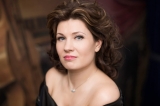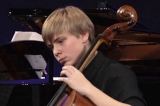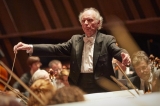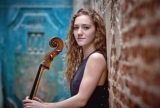You had a remarkable success with Brahms (reviews here and here) and other non-Czech composers, but you have nevertheless developed a particularly great sensitivity for Czech music. What does it you mean to you?
For me conducting music of Czech composers is like breathing. So natural, so lovely. Sometimes – like with breathing – I even stop noticing how extraordinary a privilege it is: to be an ambassador of these precious cultural creations and understand them to the smallest detail. In my career, I have tried to avoid being pigeon-holed. Out of my love and respect to music of other territories, I have always actually done more non-Czech music than Czech. Read More →
Ist diese Zeit gerade eine eindringliche Botschaft an uns? Will Beethoven gerade deutlicher zu uns durchdringen, als durch das zirkulierende, permanent-Spiel seiner Werke? Brauchen wir Taubheit für das Werte-Verständnis von Anhörung? Read More →
Your repertoire is mainly Italian, though you sang already several French roles. Why did you decide to dedicate one entire CD to this repertoire?
I always loved singing the French repertoire. The text has such a big importance, and the instrumental colors in the orchestra portray the inner emotional world of the singer, which you deliver in words. This incredibly colorful palette of sounds in an orchestra requires a rich arsenal in the human voice. It is a good challenge for me. Also, the French language with all its nasal sounds adds a specific charm to it. Read More →
Philipp, was bedeutet es für Dich als jungen Musiker, den Discovery Award der ICMA gewonnen zu haben?
Es ist eine sehr große Ehre! Ich freue mich, weil der Preis für junge Musiker so wichtig und hilfreich ist, und weil ich weiß, was aus früheren Preisträgern geworden ist. Read More →
Your opera Penthesilea has been unanimously acclaimed, notably at the last ICMA and the Belgian Caecilia Awards. It is considered by some to be the most accomplished and powerful opera you have composed so far. The music is so strong that it can perfectly do without the image. To what do you attribute the success of this work?
I’m obviously very happy with the success of this opera. By a happy combination of circumstances, the Penthesilea disc was released just as I was rehearsing my latest opera, Macbeth Underworld, which was staged here at La Monnaie a few months ago. I was immersed in Macbeth every day, and one evening I listened to Penthesilea in the apartment where I lived, in the centre of Brussels. Read More →
How does it feel to receive a distinction like the ICMA award?
Joy and satisfaction in equal parts. We are also delighted with the acceptance the album has had in France, where it has been one of the best-selling albums in recent months. Our intention is to bring music to as many people as possible, and this kind of recognition confirms that we are on the right track. Read More →
Man nehme sich Zeit für das Hören dieser instrumentalen Winterreise – und lese die abgedruckten Texte im Booklet! Verstärkt durch den eindringlichen Streichersound des Voyager-Quartets erschließt sich die ergreifende Dimension von Wilhelm Müllers Texten über Verlassensein, Liebeskummer und Todessehnsucht in einer neuen Unmittelbarkeit. Die neue CD, in hervorragender Qualität beim Solo Musica-Label erschienen (Pizzicato Rezension), polarisiert die Meinungen. Read More →
Was bedeutet das Dirigieren und Interpretieren für Sie, sowohl als Künstler wie auch als Mensch?
Ich gehöre natürlich noch zu der alten Generation an, die den hauptsächlichen Sinn des Dirigierens darin sieht, das Orchester zu dirigieren und mit der Gestik zu helfen und zu führen. Früher mussten wir Dirigenten ja mit den Orchestern noch wirklich die Werke erarbeiten. Aber heute kann fast jedes Orchester das ganze Repertoire von Beethoven bis Shostakovich, so dass der Dirigent eigentlich nur noch den reibungslosen Ablauf zu garantieren braucht. Read More →
How did you come to study the cello? Which are the main steps of your training?
It was a natural path, because at home I have ‘breathed’ music since I was little, my mother plays the piano, my brother the violin. After having ‘played’ with these two instruments, one day a cello came home. I was four and a half years old, and here I am! My first teacher was Francesco Storino, cellist of the Orchestra di Santa Cecilia in Rome, whom I was lucky enough to meet when I was part of the JuniOrchestra of the same Academy. He took me by the hand as a child and with passion and dedication made me grow, the same passion that I then transmitted in my music. Read More →
With Alina Ibragimova, you have already recorded the great works of the chamber repertoire, but not yet the Sonata by César Franck. How was this project born?
César Franck’s Sonata is a work that we missed for many years. We’ve been playing together for 15 years and we’ve gone through the great classics of the repertoire: the sonatas by Mozart, Beethoven, Schubert, Brahms…. Curiously, we only played this work at our debut, for a studio recording for the BBC, without ever playing it in concert. Read More →



























